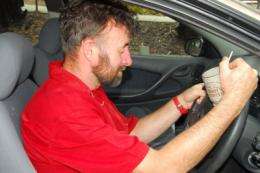(Medical Xpress) -- Young male drivers are ignoring the dangers of driving while tired, according to a new research study.
Monash University Accident Research Centre (MUARC) researcher, Dr. Ashleigh Filtness, found that younger male drivers are more susceptible to the effects of sleep restriction than older male drivers.
An analysis of sleep-related crashes in the UK has shown that they are most likely to occur in the early hours of the morning, between 2am and 4am.
These crashes tend to involve young men under the age of 25. The data also shows a small increase in sleep-related crashes in the afternoon, around 3pm, which are more likely to involve older men.
Dr. Filtness and her colleagues conducted an in-depth driving simulator study comparing the effect of sleep restriction on a group of younger men aged 20 to 26, compared with older men aged 52 to 74. The participants usually slept around eight hours a night. The night before the study, the men went to bed three hours later so they only had five hours of sleep.
To make the tests as realistic as possible, the men were required to drive for two hours in a full-sized driving simulator displaying a monotonous driving environment, such as experienced on country roads and highways. The drive time was selected to coincide with the typical ‘post lunch dip’ when people are generally less alert.
“Even though the real-life crash data shows that older male drivers were more likely to be involved in sleep-related crashes in the afternoon, our study confirmed it actually was the younger male drivers who were more affected by sleep loss the night before,” Dr. Filtness said.
“Young drivers, in particular males, tend to ignore the signs of sleepiness for a variety of reasons. They might try turning up the radio, opening the window or using the air conditioner to attempt to keep awake. Unfortunately, the research shows that none of the strategies work, and by the time their head is nodding it can be too late.”
Particularly with the long weekend coming up, it is vital that all drivers plan their trip by allowing for breaks at least every two hours or sharing the driving if possible.
“Fidgeting, stretching, yawning and lack of concentration are all signs of sleepiness. If you ignore them, the consequences could be fatal,” Dr. Filtness said.
Provided by Monash University



















